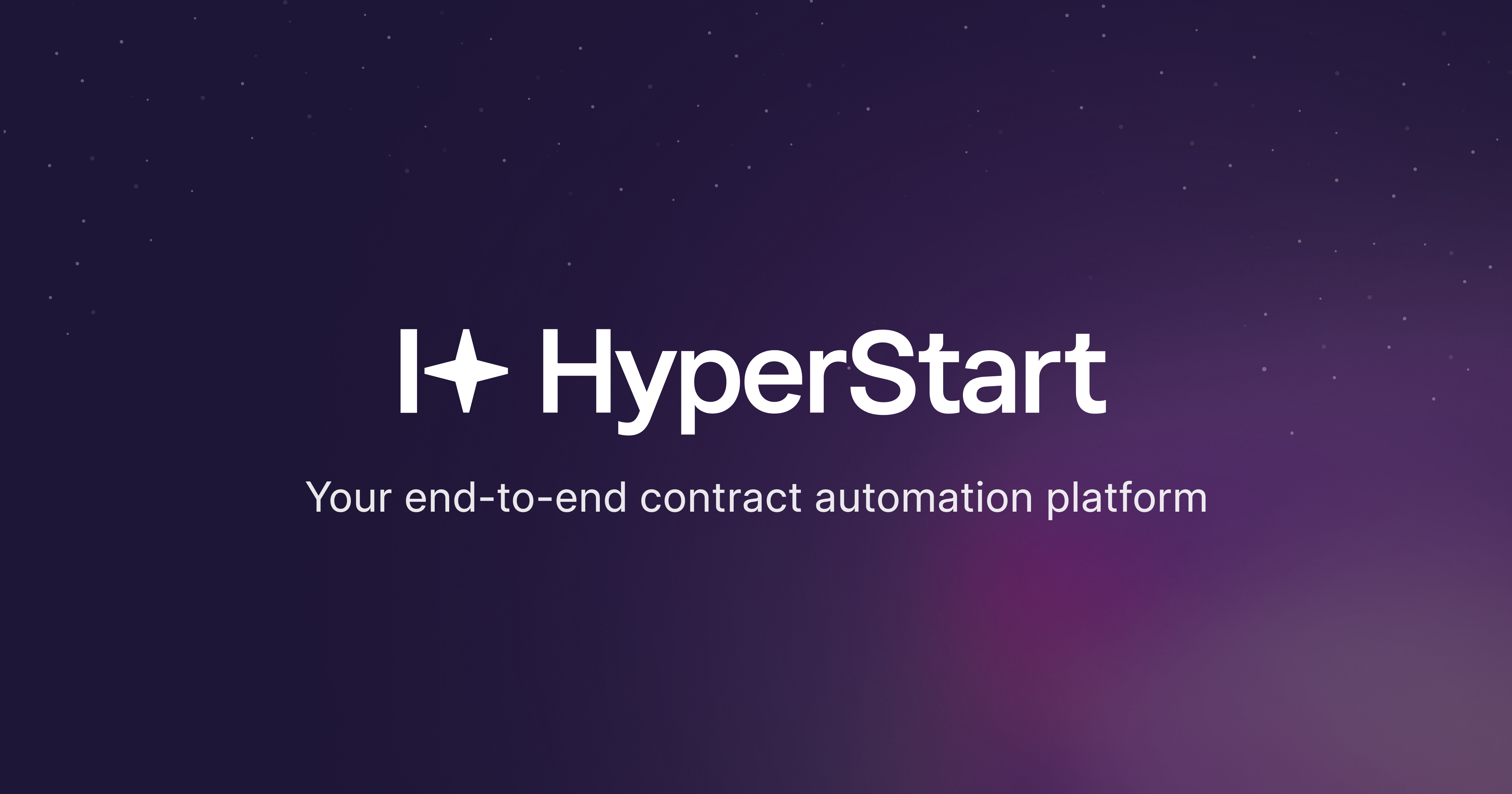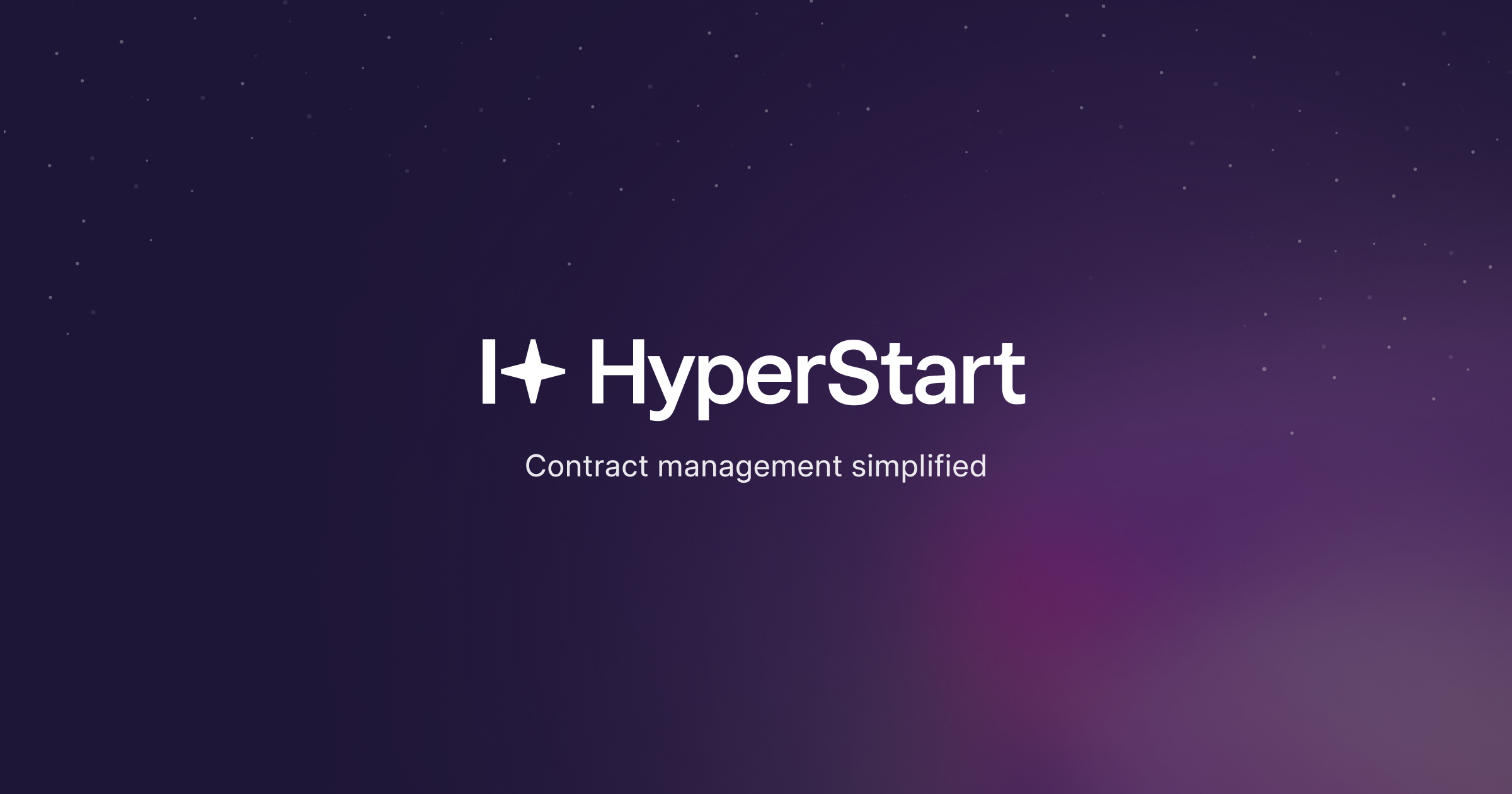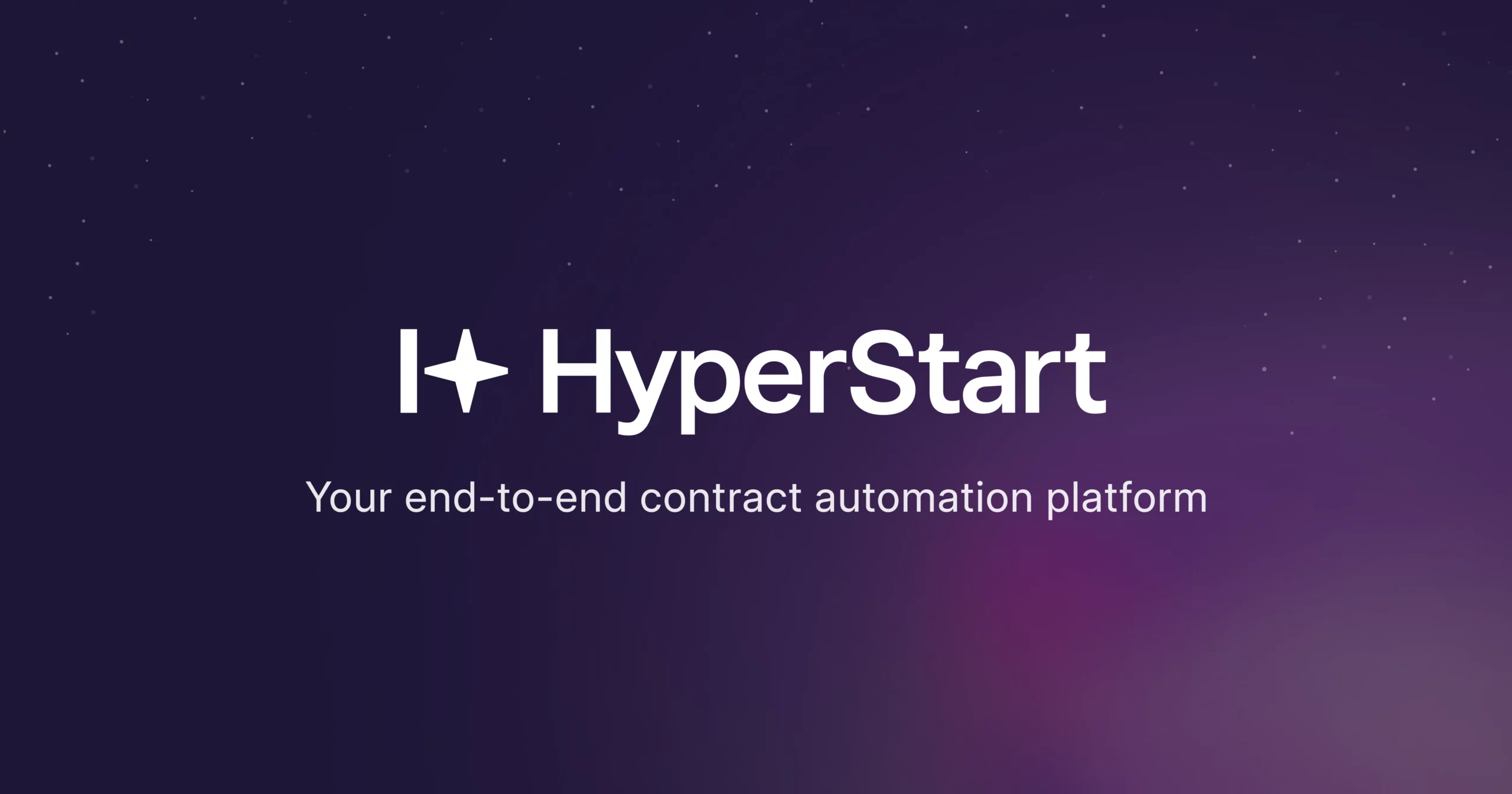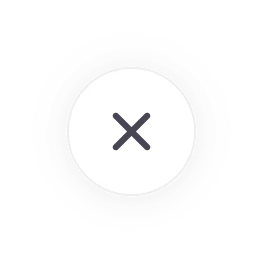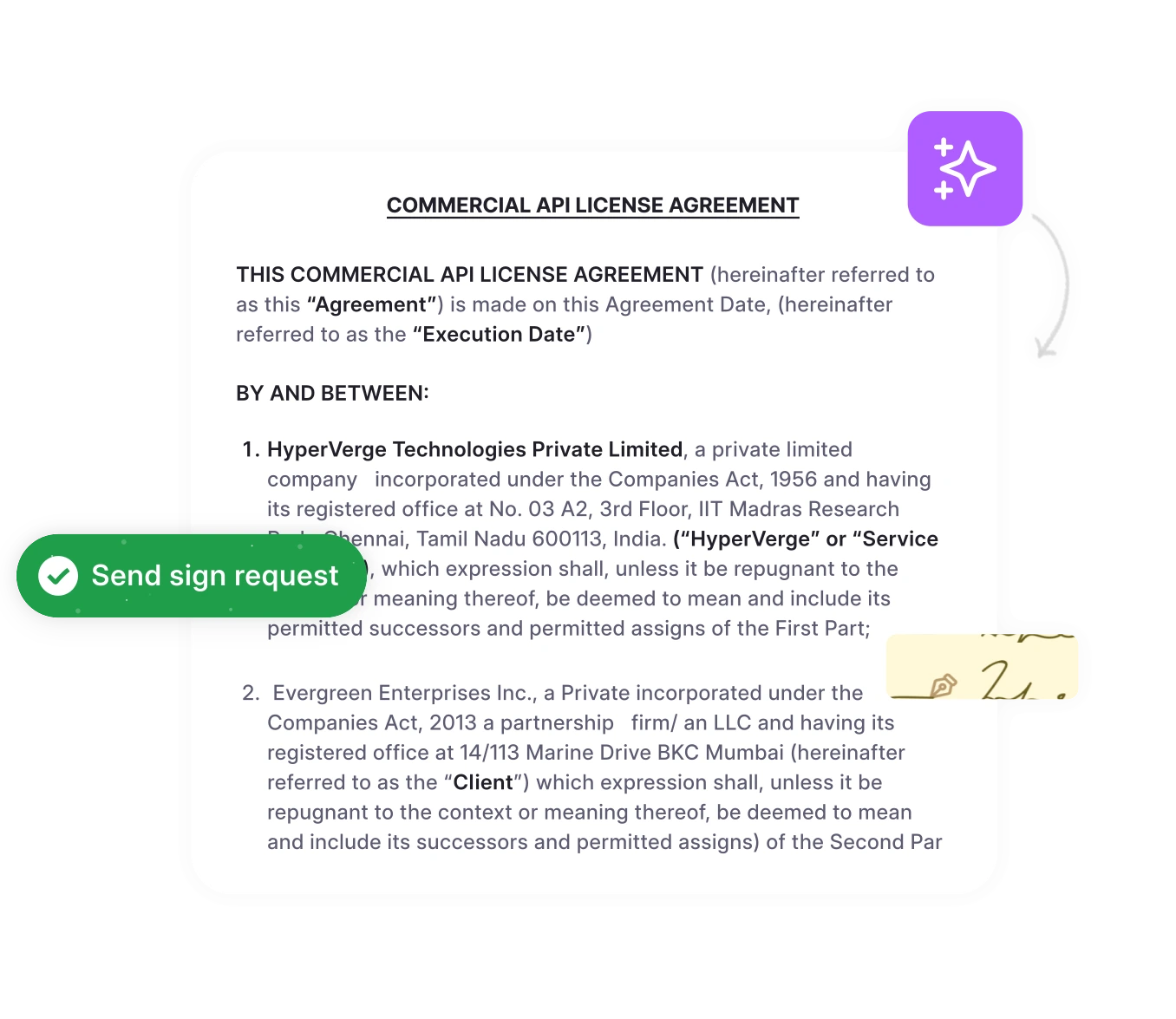Procurement teams waste hours negotiating individual contracts for recurring purchases, leading to administrative bottlenecks and inconsistent supplier terms. Framework agreements eliminate repetitive negotiations by establishing pre-approved terms for future transactions.
According to the UK National Audit Office, public sector bodies could avoid £500 million in costs over five years by improving their procurement of everyday goods and services through framework agreements. The NAO found that the government procured 72% of its large contracts through frameworks in 2021-22, compared to only 43% in 2018-19.
This complete guide covers everything procurement teams, legal professionals, and contract managers need to know about framework agreements. You’ll learn the definition, types, standard terms, benefits, and how automated procurement contract management transforms manual procurement challenges into streamlined operations.
What is a framework agreement?
A framework agreement is a long-term contract between a buyer and one or more suppliers that establishes pre-negotiated terms and conditions for future purchases (called “call-offs”) over a specified period, without committing to specific quantities or delivery dates upfront.
Unlike standard contracts, framework agreements create an umbrella structure for multiple individual transactions rather than a single purchase. Think of it as a master template that governs the structure of future contracts.
Framework agreement examples include:
- A hospital establishing a 3-year framework agreement with medical suppliers for recurring equipment purchases through call-off orders
- A government agency setting up a framework agreement with IT vendors for ongoing software and hardware needs
- A construction company creating a framework agreement in construction for material suppliers across multiple project sites
Framework agreements differ from standard business contracts because they establish the commercial relationship and terms without requiring immediate purchases or specific quantities.
What are the different types of framework agreements?
Framework agreements vary based on the number of suppliers, selection process, and industry requirements. Choosing the right type depends on procurement framework agreement needs, project complexity, and whether buyers prioritize competition, simplicity, or continuous supplier access.
The four main types of framework agreements each serve different procurement scenarios:
| Framework Type | Suppliers | Selection Process | Best For | Key Advantage |
| Single Supplier | One pre-approved supplier | Direct appointment | Specialized services, niche products | Simplified administration |
| Multi-Supplier | Multiple competing suppliers | Mini-competitions for each call-off | High-volume needs, competitive pricing | Ongoing competition |
| Dynamic Purchasing System | Unlimited (can join anytime) | Continuous electronic evaluation | Technology, innovation sectors | Market access flexibility |
| Sector-Specific | Industry-limited suppliers | Specialized qualifications | Healthcare, construction, finance | Compliance assurance |
Each framework type addresses specific procurement challenges and organizational needs:
Single supplier framework agreements
Only one pre-approved supplier provides all goods, services, or works defined in the framework. This approach works best for specialized services requiring unique expertise, niche products with limited suppliers, or long-term partnerships where trust and reliability are paramount.
Advantages:
- Simplified administration
- Stronger supplier relationships
- Predictable service quality
- Streamlined call-off process
Disadvantages:
- Limited competition
- Potential price inflexibility
- Dependency risk.
Example:
A university establishing a single supplier framework agreement with one facilities management company for all campus maintenance needs over 4 years.
Multi-supplier framework agreements
Multiple pre-qualified suppliers compete for individual call-off contracts through mini-competitions. This structure suits high-volume procurement needs, requirements for competitive pricing on each transaction, and risk diversification across suppliers.
Advantages:
- Ongoing competition maintains pricing pressure
- Supply security through multiple options
- Flexibility to match suppliers to specific project requirements.
Disadvantages:
More complex administration
Potential for supplier confusion
Requires clear mini-competition procedures
Example:
A public sector procurement framework agreement pre-qualifying 5 construction firms, then running mini-competitions for each building project awarded under the framework. In such a case, vendor contract management becomes crucial for managing multiple supplier relationships and selection processes effectively.
Dynamic Purchasing System (DPS)
An entirely electronic framework with no application closing date, allowing new suppliers to join at any time during the agreement period. DPS works best for rapidly evolving markets (technology, digital services), the need for continuous supplier pool expansion, and innovative or emerging product categories.
Advantages:
- Continuous market access to new suppliers
- Promotes innovation and competition
- Particularly SME-friendly as entry barriers are lower.
Disadvantages:
- Ongoing evaluation workload
- Complexity in supplier management
- Requires robust digital procurement systems.
Example:
G-Cloud framework for UK public sector cloud computing services, where suppliers can apply year-round. Here, implementing digital contract management becomes essential for managing electronic procurement systems and the continuous onboarding of suppliers required for DPS.
Sector-specific framework agreements
Frameworks limited to suppliers within a specific industry or service category suit specialized technical requirements, regulatory compliance needs (healthcare, finance), and situations requiring industry-specific certifications.
Examples:
- NHS framework agreements for medical device suppliers with healthcare certifications
- IT services framework agreements for technology contractors
- Framework agreements in construction for building contractors with specific trade qualifications.
Advantages:
- Pre-qualified suppliers already meet industry standards
- Faster evaluation due to a focused supplier pool
- Enhanced compliance assurance.
Healthcare framework agreements limited to suppliers with medical device certifications and regulatory approvals ensure patient safety and regulatory compliance while streamlining procurement processes.
Ready to eliminate manual tracking?
Modern contract lifecycle management platforms automate workflows from supplier onboarding to renewal alerts.
Book a DemoWhat are the standard terms and conditions of a framework agreement?
Standard terms and conditions form the backbone of framework agreement contracts, establishing the legal and operational framework for all future call-off contracts. These pre-negotiated clauses ensure consistency, compliance, and clarity across multiple transactions without requiring renegotiation for each purchase.
Framework agreements typically include four core areas of terms and conditions as follows:
Pricing and payment terms
- Fixed pricing structures
Pre-agreed unit prices or rate cards are valid for the framework duration. Most frameworks incorporate price adjustment mechanisms such as inflation indices, market fluctuation clauses, and volume-based discounts to maintain fairness over time.
- Payment schedules
Invoice timelines (such as net 30 days), accepted payment methods, and early payment incentives. Currency and tax provisions address applicable tax rates and currency exchange handling for international frameworks.
Delivery and quality standards
- Service level requirements
Response times, delivery lead times, and availability guarantees that suppliers must meet. Quality specifications establish product standards, required certifications, and inspection protocols to ensure consistent delivery.
- Acceptance criteria
Testing procedures, rejection, and replacement policies for non-conforming goods or services. Warranty provisions specify defect coverage periods and repair/replacement obligations.
Service agreements provide detailed guidance on service level requirements, quality specifications, and performance standards that support framework agreement implementation.
Legal and compliance provisions
- Liability limitations
Caps on damages, indemnification clauses, and insurance requirements to manage risk exposure. Confidentiality and data protection clauses address non-disclosure obligations, GDPR compliance, and data handling protocols.
- Intellectual property rights
Ownership of deliverables, licensing terms, and brand usage guidelines. Regulatory compliance requirements cover industry-specific regulations, health and safety standards, and environmental requirements.
Understanding contract law fundamentals helps procurement teams navigate the legal framework, regulatory compliance requirements, and contractual obligations in framework agreements.
Performance monitoring and termination
- KPIs and reporting
Performance metrics, regular reporting schedules, and audit rights for buyers. Dispute resolution mechanisms outline escalation procedures, mediation processes, and arbitration clauses for managing conflicts.
- Termination conditions
Notice periods, breach remedies, and early exit provisions. Contract variation procedures address amendment processes, scope change management, and extension options.
Contract performance management covers KPIs, reporting requirements, audit rights, and performance tracking essential for framework agreement success.
Framework agreement vs contract: What’s the difference?
While framework agreements and standard contracts are both legally binding documents, they serve fundamentally different purposes in the procurement process. Understanding the difference between a framework agreement and a contract helps organizations choose the right approach for their purchasing needs and avoid common pitfalls in supplier relationship management.
Framework agreements and standard contracts differ across six key dimensions that impact procurement strategy, cost efficiency, and operational flexibility:
| Aspect | Framework Agreement | Standard Contract |
| Purpose | Establishes terms for multiple future purchases over an extended period | Single transaction or specific project with defined deliverables |
| Purchase commitment | No obligation to purchase specific quantities; call-offs placed as needed | Binding commitment to purchase agreed quantities or services |
| Duration | Long-term (typically 1-4 years) | Single transaction or fixed project timeline |
| Pricing | Pre-negotiated rates for future use | Fixed price for specific deliverables |
| Flexibility | High – call-offs placed based on actual need | Low – changes require renegotiation or amendments |
| Administrative efficiency | One-time negotiation for multiple transactions | A separate negotiation is required for each purchase |
| Selection process | Mini-competitions among pre-approved suppliers (multi-supplier frameworks) | Full tender process for each contract award |
The fundamental differences highlighted in this comparison demonstrate why frameworks excel for recurring procurement needs.
A major advantage of framework agreements is that there is a single contract notice published and a single procurement process, which covers both the establishment of the framework agreement and the subsequent award of contracts. This speeds up procurement timetables and can increase efficiency and significantly reduce costs for both the contracting authority and the economic operators, particularly when combined with centralized purchasing and e-procurement.
Read
Understanding binding obligations
- Framework binding elements
Terms, conditions, and procedures are legally enforceable. Suppliers must honor pre-agreed pricing and standards when call-offs are placed, but frameworks don’t obligate buyers to purchase minimum quantities or award a specific number of contracts.
- Call-off enforceability
Each call-off becomes a binding contract once placed, subject to the framework’s pre-established terms. This differs from MOUs, as framework agreements are legally binding commercial contracts while Memoranda of Understanding are typically non-binding statements of intent.
- Public vs private sector
Public sector frameworks often have additional regulatory compliance requirements under procurement law. Understanding elements of a contract helps clarify legally binding elements and enforceability requirements.
How call-off contracts work
Mini-competitions
Individual purchases are executed through “call-off” or “call-down” orders that reference the parent framework agreement. Call-offs specify only quantity, delivery date, location, and project-specific details while inheriting all framework terms automatically.
In multi-supplier frameworks, buyers may run mini-tenders among pre-approved suppliers for specific call-offs to ensure competitive pricing. This process reduces procurement framework time by 60-80% compared to full tender processes.
Documentation
Each call-off creates a separate contract record while maintaining linkage to the master framework for compliance tracking and audit purposes.
Key differences in flexibility and transactions
- Framework agreements
Accommodate market changes, buyer requirement shifts, and scope adjustments without full renegotiation, while standard contracts remain rigid once executed. Frameworks enable recurring transactions over time and strengthen supplier relationships while maintaining procurement consistency.
- Specificity levels
Frameworks are intentionally general on volumes and timing to provide flexibility, while contracts include detailed specifications about all deliverables, timelines, and performance requirements.
- Risk allocation
Distributes across multiple transactions in frameworks, while standard contracts concentrate risk in a single engagement. Contract negotiation strategies differ significantly between framework establishment and individual contract negotiations.
What are the benefits of using framework agreements?
Framework agreements deliver measurable advantages across procurement efficiency, cost management, and risk mitigation. According to the European Parliament’s Policy Brief on Public Procurement, public procurement accounts for 14% of EU GDP, totaling approximately €2 trillion annually across more than 250,000 public authorities, making procurement efficiency improvements significant for the entire economy.
The three primary benefit categories demonstrate why organizations adopt framework agreements:
Faster procurement with lower costs
- Eliminates repetitive tendering
Single upfront procurement framework agreement processes replace individual tenders for each purchase, reducing administrative burden by 60-80%. Pre-negotiated terms eliminate per-purchase legal reviews, approval cycles, and negotiation expenses.
- Faster order fulfillment
Pre-approved suppliers enable immediate call-off placement without tender waiting periods. Volume commitments and long-term relationships secure better unit pricing compared to one-off purchases.
- Streamlined approvals
Simplified internal approval processes for call-offs since framework terms are pre-vetted by legal and procurement teams. Resource optimization allows procurement teams to focus on strategic sourcing rather than repetitive contract administration.
A government agency reduced average procurement framework time from 6 months to 2 weeks by using framework agreements for recurring IT services, demonstrating the time-to-value advantage of frameworks over traditional procurement.
Reliable suppliers and secure supply chains
- Guaranteed supply
Pre-vetted, pre-approved suppliers ensure consistent product and service availability. Long-term frameworks build trust, collaboration, and mutual understanding of requirements between buyers and suppliers.
- Quality assurance
Supplier performance monitoring across multiple transactions enables data-driven quality improvements over time. Multi-supplier frameworks provide backup options if one supplier faces capacity or quality issues.
- Relationship benefits
Suppliers invest more in customer success within long-term framework agreement relationships compared to transactional purchasing. Performance tracking provides consolidated views of supplier delivery, quality, and responsiveness across all call-offs.
- Supply continuity
Frameworks maintain pre-qualified supplier pools that prevent supply chain disruptions during market volatility or supplier capacity constraints.
Supplier contract management demonstrates strategic supplier relationship management and partnership benefits that framework agreements enable through long-term collaborative relationships.
Framework agreements allow procuring entities to focus on their raison d’être—procurement of specialized goods or services—rather than dedicating resources to common goods and services. This results in easier monitoring of transactions, better integrity of the procurement process through centralized oversight, and better compliance with regulations.
Read
Better compliance and risk control
- Standardized terms
Consistent application of company policies, legal requirements, and procurement regulations across all purchases. Centralized documentation of framework agreement establishment, call-off orders, and supplier performance provides audit trails for regulatory compliance.
- Budget control
Price certainty and pre-negotiated rates enable accurate forecasting and budget management. Standardized supplier lists and pre-approved frameworks minimize unauthorized purchases outside procurement policies (maverick spending).
- Regulatory compliance
Public sector framework agreements ensure adherence to procurement regulations, fair competition rules, and transparency requirements. Contract visibility provides consolidated views of all commitments, renewal dates, and obligations across multiple call-offs.
- Risk management
Pre-vetted suppliers reduce exposure to quality issues, compliance violations, and delivery failures. Contract compliance covers regulatory adherence, audit trails, and risk mitigation strategies essential for framework agreement governance.
When should you use a framework agreement?
Framework agreements in procurement are most valuable when procurement needs are recurring but unpredictable in volume or timing.
Understanding when frameworks deliver maximum value (and when standard contracts are more appropriate) helps organizations optimize procurement strategies and resource allocation.
Consider these scenarios when evaluating framework agreements versus traditional contracting:
Ideal scenarios for framework agreements
- Recurring procurement needs
Regular purchases of the same goods or services categories where demand is predictable but quantities vary (office supplies, IT equipment, professional services, maintenance contracts). Multiple stakeholders across departments, locations, or entities benefit from purchasing under consistent terms.
- Uncertain volumes
Predictable need for specific goods/services but unpredictable timing or quantities across the framework period. Public sector procurement often requires transparent, competitive, and compliant procurement framework agreements to meet regulatory requirements.
- Complex supply chains
Industries requiring pre-qualified suppliers with specific certifications, regulatory compliance, or quality standards (healthcare, construction, financial services) benefit significantly from framework approaches.
Industry-specific examples
- Construction
Framework agreements in construction establish pre-approved contractors across multiple building projects, maintenance services, or material supplies for various sites. Construction contract management shows industry-specific applications for construction projects and contractors.
- IT and technology
G-Cloud frameworks for cloud services, IT services framework agreements for software licensing, hardware procurement, and digital transformation projects enable the technology sector’s efficiency. IT contract management covers technology sector frameworks, G-Cloud examples, and IT procurement best practices.
- Healthcare
Medical equipment, pharmaceutical supplies, and facilities management services requiring specialized certifications ensure patient safety while streamlining procurement processes.
- Professional services
Legal services, consulting, temporary staffing, and marketing agencies for ongoing project needs benefit from pre-negotiated rates and terms.
When are standard contracts more appropriate?
- One-time large purchases
Single capital investments, major equipment purchases, or unique projects with defined scope and timeline work better with standard contracts. Highly specialized needs requiring bespoke terms, unique specifications, or project-specific negotiations don’t suit framework approaches.
- Short-term needs
Immediate purchases without future recurring requirements make the framework agreement overhead unjustified. Low-value, infrequent purchases where establishing framework processes exceeds transaction value should use standard contracts.
- Fixed project scope
Specific deliverables with clear start and end dates, such as building construction or software development projects, suit traditional contracting better. Single supplier necessity situations involving proprietary products, exclusive licensing, or situations where only one supplier can fulfill requirements don’t benefit from framework competition.
Streamline framework agreement management with HyperStart
Managing framework agreements across multiple suppliers creates complexity in tracking call-offs, monitoring renewal dates, supplier performance, and maintaining compliance across hundreds of individual transactions.
Spreadsheets and disconnected systems result in missed renewal opportunities, expired frameworks, incomplete audit trails, and an inability to analyze spending patterns effectively.
Framework agreements deliver measurable ROI but only when supported by centralized, automated management systems that can handle the complexity of multi-supplier, multi-year agreements.HyperStart – AI-powered CLM platform is purpose-built for procurement teams managing framework agreements and call-off contracts. Our solution delivers:
- Import existing framework agreements in minutes with AI metadata extraction, eliminating manual data entry and accelerating digitization
- Automated renewal alerts prevent missed opportunities and expired frameworks, ensuring continuous supply chain security
- Track all call-off contracts linked to parent frameworks with complete transaction visibility and audit trails
- 80% faster contract processing from framework agreement establishment to call-off execution
- Real-time dashboards showing supplier performance, spend analytics, and framework utilization across all agreements
- Native integration with procurement systems, CRMs, and e-signature platforms for seamless workflows
Transform your framework agreement management from spreadsheet chaos to automated efficiency. Our AI contract management platform delivers AI-powered CLM solutions, automated procurement, and measurable efficiency gains that procurement teams need for strategic success.








